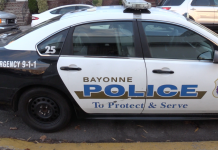Through a new partnership with Secaucus-based Schneider Electric, Jersey City’s first Energy Savings Improvement Program (ESIP) to reduce operational costs and improve energy resiliency could net the city $21M in savings over the next two decades.

By John Heinis/Hudson County View
Two related but separate resolutions will go before the city council this evening: one to provide a third-party review of the city’s energy plan and the other to authorize and install repayment agreements with PSE&G in connection to their energy savers program.
“Having experienced Superstorm Sandy and, more recently, witnessing the devastating power outages in Texas last month, we’ve been working to establish a strong and resilient infrastructure to keep our community safe and healthy, every day and through every level of emergency,” said Mayor Steven Fulop said in a statement.
“This microgrid and the entire ESIP program will serve as a national resiliency model saving us millions of dollars and significantly reducing our carbon footprint, while improving air quality and the overall health and quality of life for our residents.”
Under the ESIP, Jersey City would also become the first in the country to create a self-sustainable municipal microgrid utilizing the 1.23 MW solar panel array installed at DPW last year to ensure continuity of vital service operations utilizing the municipal electric vehicle (EV) fleet operations, specifically EV garbage trucks.
The resolution to approve the PSE&G Energy Savers program, which costs $584,161 – with the city covering $175,248.45 – is meant to further drive significant budgetary savings as part of the ESIP by installing various amenities across 22 city-owned facilities.
Those additions include new LED lighting, water conservation measures, HVAC equipment replacements, and other energy efficiencies upgrades.
The city’s monthly savings would exceed monthly energy payments, therefore this would have a net positive impact on Jersey City’s utility costs and help fund other improvements within the ESIP.
“My colleague Dan Riggle and I, and the whole Schneider Electric team, are proud to have the opportunity to work with Mayor Fulop and Jersey City on this exciting project,” said former Hoboken Mayor Dawn Zimmer, now a representative with Schneider Electric.
“The $21 million in energy savings and incentives generated by this landmark ESIP project will help Jersey City lead the way in promoting sustainability, energy efficiency and resiliency while funding urgent capital improvements.”
As part of the administration’s sustainability and resiliency efforts to ensure reliable operations, the Mary McLeod Bethune Life Center – which provides vital community services, including current operations as a vaccination site and a Red Cross emergency shelter for the community – is one of the 22 city buildings pegged to be retrofitted with energy updates including HVAC replacement, a new roof, and solar power.
The resolution to formally adopt the full ESIP is scheduled to go before city council for a vote in April.
Fulop joined the Mayors for Climate Coalition in 2017 following then-President Donald Trump’s (R) withdrawal from the Paris Climate Agreement.
Zimmer, like Fulop, stood by the Paris Climate Agreement as a mayor and was also a member the U.S. Environmental Protection Agency’s Regional 2 Local Advisory Committee.
She also joined the Mayors for Climate Coalition prior to the end of her term in 2017.











Nice political gig there from a supposed political outsider… Certainly hired for her engineering and energy expertise.
This “could net the city” but we know what’s netted actually is contract feeding at the public trough.
She actually knows more about the Terror Flier with Ravi. Ask her.
I dare Dawn Zimmerman to answer on what she knows about that.